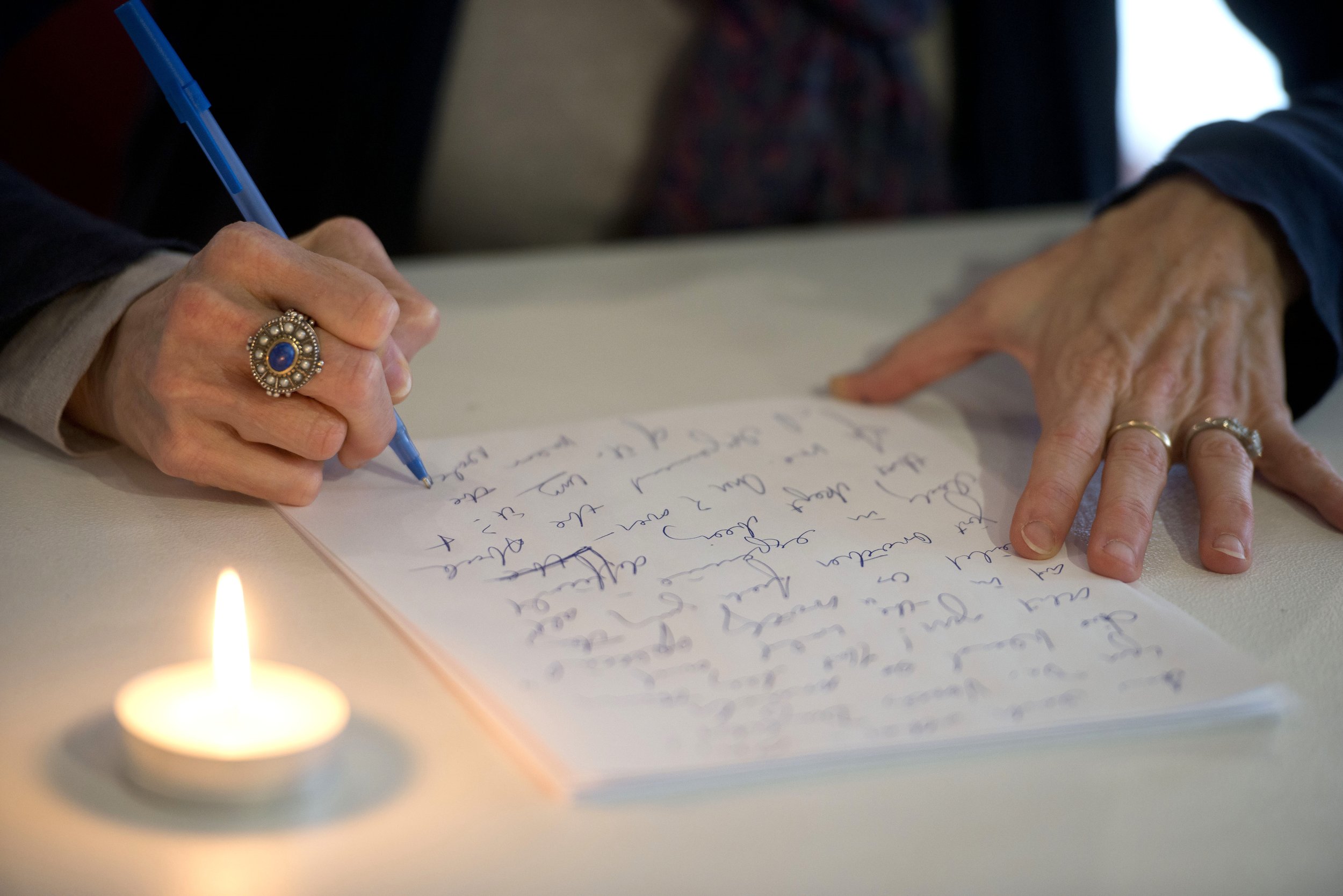

"Proprioceptive Writing is a wisdom practice of the simplest and highest kind. It is a practice of liberation. One Write at a time."– Anne Shodo Dellenbaugh, Zen priest, Sheepscot River Refuge
What is Proprioceptive Writing®?
Proprioceptive Writing (PW) is the only writing practice that helps you slow your thoughts and focus on your sense of inner hearing. It calls forth your imagination, your intellect, and your intuition all at once to open your heart and clear your mind.
This writing meditation is practiced in 25-minute sessions while listening to Baroque music, which mimics the steady rhythm of the human pulse. It can be practiced alone or in groups. At the end of each session, you have a text, which we call a Write.
Unlike formal writing, Writes are neither good nor bad. They are not essays, prose poems, short stories, or diary entries – though they may lead to them. Writes are never planned or polished, so no one assesses them for their art. You never revise them. The magic of a PW practice happens because of the insights and feelings we uncover through our writing while we are completely focused on and attentive to our thoughts.
Notwithstanding its simplicity, PW is profound and can alter your life in both subtle and remarkable ways. It is used as a path to creative self-expression and as a form of meditation and spiritual renewal. When used for inner, emotional work, the practice becomes a means to understand yourself better, solve personal problems, and ultimately, become happier and more confident.
As one student put it:
“PW has an intense, slow burn – and a long afterglow.”Why such a funny name?
The word proprioception comes from the Latin proprius, meaning, “one’s own”. It normally refers to our body’s proprioceptive system – a little-known “sixth sense” that gathers and processes information from the inner world of our body. Within this system – located in our muscles, joints, and tendons – nerves called “proprioceptors” communicate with the brain, orienting the body to its own movements and position in space.
We use the term metaphorically. As the body has an ongoing sense of its own identity through proprioceptive information, the mind also “knows” itself proprioceptively, whenever we become aware of our own perceptions and feel their meaning to us.

Hear founder, Linda Trichter Metcalf, speak about Proprioceptive Writing
A consistent PW practice fosters:
deepened powers of attention
increased self-trust
greater intimacy and spontaneity in relationships
more creative energy
burgeoning mental and emotional vitality
THE HISTORY OF PROPRIOCEPTIVE WRITING
In the summer of 1976, Proprioceptive Writing Founder Linda Trichter Metcalf, an assistant professor of English and Humanities at Pratt Institute in Brooklyn, camped out in the attic of an old stone house searching for the subject she would use as the basis of her doctoral dissertation.
In academic circles, this was the age of reader-response theory which, for the first time in literary criticism, included the reader’s perceptions in the process of determining the meaning of a literary work. So Linda set out to track her thinking as she read a novel, moving through it word-by-word, and phrase by phrase, recording the thoughts that came to her.
Linda continues to offer in-depth discussion of Writes privately, in weekly small group conference calls, and at immersions. She directs the PW teacher training program and leads a growing faculty devoted to bringing PW to an expanding audience.
The Proprioceptive Writing Method has been taught to thousands of students. PW workshops have been held at every major US center for holistic studies, including Esalen, Omega, Rowe, Kripalu, New York Open Center, and 1440 Multiversity.
During this three month intensive written investigation into her thinking mind, something powerful happened. Linda began to experience herself differently.
Her mind felt enlivened, as if it were in movement, whereas before it had felt static. She discovered stories she didn’t know were in her, and feelings not accessed in daily life. Nothing in her education or in years of talk therapy had affected her in this way. To be learning from herself, to feel at one with herself! What miracle had achieved this end?
Linda felt a calling to teach this remarkable method of self-discovery-through-writing to others, and when she returned to teaching in the fall, she had developed an entirely new method of writing and teaching based on her experiences.
The following semester, she was joined by fellow Pratt English professor Tobin Simon, PhD. As they brought Proprioceptive Writing into their classrooms and witnessed the dramatic results it had on students, they decided to redirect their teaching careers altogether. They left the world of academia and in 1982 founded the Proprioceptive Writing Center in Rockport, Maine.
Through the center they offered PW in multiple formats: privately, in groups, as 2-day weekend intensives, as 5-day retreats, as weekly classes, and as yearly seminars. They taught PW to home-schooled and public-school children. They introduced PW at holistic studies centers, as well as to psychiatrists, psychotherapists, teachers, artists, and ministers. They developed a curriculum for a PW teacher-certification program, after which others began teaching PW across the country – and around the world.
The PWCenter was incorporated as a nonprofit educational institution in Portland, Maine, in 1987, relocated to New York City in 1996, and was established in Oakland, Calif., in 2006. At that time, Toby was suffering from Parkinson’s Disease and succumbed to it in July of 2020. In those years, as Linda taught and trained teachers, she continued to clarify her theory of mental proprioception and bring it forth in the form of a new PW Comprehensive Program. In 2021, Linda and her new assistant director, Anne Bright, set out to create workbooks for every aspect of this program so that, going forward, PW teachers can be trained to teach PW in a way that maintains its greatest effectiveness.
Dissertations and graduate papers have been written about PW at the Harvard School of Education, the University of Massachusetts, Amherst, and many other institutions. Today, with the help of Writing the Mind Alive, PW is practiced alone and in groups around the world.



